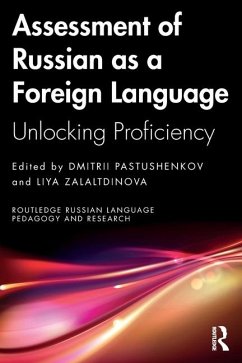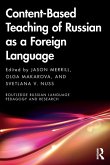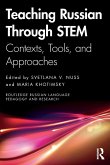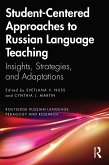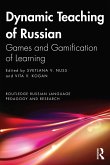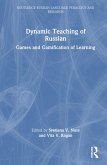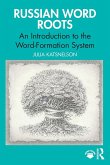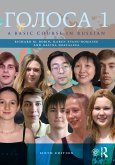Assessment of Russian as a Foreign Language
Unlocking Proficiency
Herausgeber: Pastushenkov, Dmitrii; Zalaltdinova, Liya
Assessment of Russian as a Foreign Language
Unlocking Proficiency
Herausgeber: Pastushenkov, Dmitrii; Zalaltdinova, Liya
- Broschiertes Buch
- Merkliste
- Auf die Merkliste
- Bewerten Bewerten
- Teilen
- Produkt teilen
- Produkterinnerung
- Produkterinnerung
Assessment of Russian as a Foreign Language: Unlocking Proficiency explores recent research, methodologies, and practices in Russian language assessment, offering a comprehensive guide for teachers, researchers, and administrators.
Andere Kunden interessierten sich auch für
![Content-Based Teaching of Russian as a Foreign Language Content-Based Teaching of Russian as a Foreign Language]() Content-Based Teaching of Russian as a Foreign Language59,99 €
Content-Based Teaching of Russian as a Foreign Language59,99 €![Teaching Russian Through STEM Teaching Russian Through STEM]() Teaching Russian Through STEM61,99 €
Teaching Russian Through STEM61,99 €![Student-Centered Approaches to Russian Language Teaching Student-Centered Approaches to Russian Language Teaching]() Student-Centered Approaches to Russian Language Teaching48,99 €
Student-Centered Approaches to Russian Language Teaching48,99 €![Dynamic Teaching of Russian Dynamic Teaching of Russian]() Dynamic Teaching of Russian38,99 €
Dynamic Teaching of Russian38,99 €![Dynamic Teaching of Russian Dynamic Teaching of Russian]() Dynamic Teaching of Russian154,99 €
Dynamic Teaching of Russian154,99 €![Russian Word Roots Russian Word Roots]() Julia KatsnelsonRussian Word Roots56,99 €
Julia KatsnelsonRussian Word Roots56,99 €![Golosa Golosa]() Richard RobinGolosa108,99 €
Richard RobinGolosa108,99 €-
-
-
Assessment of Russian as a Foreign Language: Unlocking Proficiency explores recent research, methodologies, and practices in Russian language assessment, offering a comprehensive guide for teachers, researchers, and administrators.
Produktdetails
- Produktdetails
- Routledge Russian Language Pedagogy and Research
- Verlag: Taylor & Francis Ltd
- Seitenzahl: 240
- Erscheinungstermin: 29. Juli 2025
- Englisch
- Abmessung: 234mm x 156mm x 13mm
- Gewicht: 364g
- ISBN-13: 9781032758114
- ISBN-10: 1032758112
- Artikelnr.: 73334169
- Herstellerkennzeichnung
- Libri GmbH
- Europaallee 1
- 36244 Bad Hersfeld
- gpsr@libri.de
- Routledge Russian Language Pedagogy and Research
- Verlag: Taylor & Francis Ltd
- Seitenzahl: 240
- Erscheinungstermin: 29. Juli 2025
- Englisch
- Abmessung: 234mm x 156mm x 13mm
- Gewicht: 364g
- ISBN-13: 9781032758114
- ISBN-10: 1032758112
- Artikelnr.: 73334169
- Herstellerkennzeichnung
- Libri GmbH
- Europaallee 1
- 36244 Bad Hersfeld
- gpsr@libri.de
Dmitrii Pastushenkov, Ph.D., is a Preceptor in Slavic Languages and Literatures at Harvard University with professional experience in foreign and second language teaching, teacher education, translation, as well as research in applied linguistics and second language acquisition. He specializes in instructed second language acquisition, aiming to enhance the effectiveness and inclusiveness of language learning in educational settings and bridge the gap between research and pedagogy. Liya Zalaltdinova, Ph.D., is a Preceptor in Slavic Languages and Literatures at Harvard University. Her research interests center on second language learners' pragmatic competence and innovative strategies in language education as well as decentralization and diversification of Russian language curricula.
List of contributors
Preface
DMITRII PASTUSHENKOV AND LIYA ZALALTDINOVA
Acknowledgements
Terminology
PART I
Documenting Russian language assessment: Approaches and practices
1. Assessment in Russian as a Foreign Language: Current approaches,
emerging trends, and future directions
DMITRII PASTUSHENKOV AND LIYA ZALALTDINOVA
2. The significance of assessment in Russian as a Foreign Language
literature
MAGDALENA KALTSEIS AND WOLFGANG STADLER
3. Assessing proficiency outcomes in the Russian Flagship Program,
2014-2024
WILLIAM COMER AND DAN E. DAVIDSON
4. Proficiency assessment practices and reading and listening proficiency
outcomes in a U.S. Russian Flagship Program
DIANNA MURPHY, KAREN EVANS-ROMAINE, AND ANNA TUMARKIN
PART II
Linguistic analysis in Russian language assessment
5. Measuring lexical knowledge in Russian as a Second Language:
Exploring the potential of lexical lists for language proficiency
assessment
OLESYA KISSELEV, MIHAIL KOPOTEV, AND ANTON VAKHRANEV
6. A constructionist approach to assessment of language proficiency in
Russian as a Foreign Language
ANNA ENDRESEN AND VALENTINA ZHUKOVA
PART III
Social justice and diversity in Russian language assessment
7. A case study of feminist assessment in Russian language classes
VETA CHITNEV
8. Beyond grades: A humanistic approach to Russian language learning
through ungrading
EVGENY DENGUB
PART IV
Rethinking Russian language assessment and embracing the change
9. Implementing a proficiency-based curriculum for Russian: A case study of
a Russian Flagship Program
VICTORIA HASKO
10. Leveraging generative AI Chatbots to assess writing in the Russian
language classroom: A model portfolio assignment with chatbot feedback
KIT PRIBBLE
11. "Time Capsule Interviews": Self-assessment tool for students of Russian
at the advanced level of language proficiency
LIYA ZALALTDINOVA AND ANNA IVANOV
PART V
Emerging Russian language assessment strategies
12. Cheating the system: Students' perspectives on the authorized cheat
sheet as a positive psychology intervention
EMIL ASANOV
13. Tech-savvy language assessment: Leveraging nine educational platforms
and gamified digital tools
OLESIA PAVLENKO
Index
Preface
DMITRII PASTUSHENKOV AND LIYA ZALALTDINOVA
Acknowledgements
Terminology
PART I
Documenting Russian language assessment: Approaches and practices
1. Assessment in Russian as a Foreign Language: Current approaches,
emerging trends, and future directions
DMITRII PASTUSHENKOV AND LIYA ZALALTDINOVA
2. The significance of assessment in Russian as a Foreign Language
literature
MAGDALENA KALTSEIS AND WOLFGANG STADLER
3. Assessing proficiency outcomes in the Russian Flagship Program,
2014-2024
WILLIAM COMER AND DAN E. DAVIDSON
4. Proficiency assessment practices and reading and listening proficiency
outcomes in a U.S. Russian Flagship Program
DIANNA MURPHY, KAREN EVANS-ROMAINE, AND ANNA TUMARKIN
PART II
Linguistic analysis in Russian language assessment
5. Measuring lexical knowledge in Russian as a Second Language:
Exploring the potential of lexical lists for language proficiency
assessment
OLESYA KISSELEV, MIHAIL KOPOTEV, AND ANTON VAKHRANEV
6. A constructionist approach to assessment of language proficiency in
Russian as a Foreign Language
ANNA ENDRESEN AND VALENTINA ZHUKOVA
PART III
Social justice and diversity in Russian language assessment
7. A case study of feminist assessment in Russian language classes
VETA CHITNEV
8. Beyond grades: A humanistic approach to Russian language learning
through ungrading
EVGENY DENGUB
PART IV
Rethinking Russian language assessment and embracing the change
9. Implementing a proficiency-based curriculum for Russian: A case study of
a Russian Flagship Program
VICTORIA HASKO
10. Leveraging generative AI Chatbots to assess writing in the Russian
language classroom: A model portfolio assignment with chatbot feedback
KIT PRIBBLE
11. "Time Capsule Interviews": Self-assessment tool for students of Russian
at the advanced level of language proficiency
LIYA ZALALTDINOVA AND ANNA IVANOV
PART V
Emerging Russian language assessment strategies
12. Cheating the system: Students' perspectives on the authorized cheat
sheet as a positive psychology intervention
EMIL ASANOV
13. Tech-savvy language assessment: Leveraging nine educational platforms
and gamified digital tools
OLESIA PAVLENKO
Index
List of contributors
Preface
DMITRII PASTUSHENKOV AND LIYA ZALALTDINOVA
Acknowledgements
Terminology
PART I
Documenting Russian language assessment: Approaches and practices
1. Assessment in Russian as a Foreign Language: Current approaches,
emerging trends, and future directions
DMITRII PASTUSHENKOV AND LIYA ZALALTDINOVA
2. The significance of assessment in Russian as a Foreign Language
literature
MAGDALENA KALTSEIS AND WOLFGANG STADLER
3. Assessing proficiency outcomes in the Russian Flagship Program,
2014-2024
WILLIAM COMER AND DAN E. DAVIDSON
4. Proficiency assessment practices and reading and listening proficiency
outcomes in a U.S. Russian Flagship Program
DIANNA MURPHY, KAREN EVANS-ROMAINE, AND ANNA TUMARKIN
PART II
Linguistic analysis in Russian language assessment
5. Measuring lexical knowledge in Russian as a Second Language:
Exploring the potential of lexical lists for language proficiency
assessment
OLESYA KISSELEV, MIHAIL KOPOTEV, AND ANTON VAKHRANEV
6. A constructionist approach to assessment of language proficiency in
Russian as a Foreign Language
ANNA ENDRESEN AND VALENTINA ZHUKOVA
PART III
Social justice and diversity in Russian language assessment
7. A case study of feminist assessment in Russian language classes
VETA CHITNEV
8. Beyond grades: A humanistic approach to Russian language learning
through ungrading
EVGENY DENGUB
PART IV
Rethinking Russian language assessment and embracing the change
9. Implementing a proficiency-based curriculum for Russian: A case study of
a Russian Flagship Program
VICTORIA HASKO
10. Leveraging generative AI Chatbots to assess writing in the Russian
language classroom: A model portfolio assignment with chatbot feedback
KIT PRIBBLE
11. "Time Capsule Interviews": Self-assessment tool for students of Russian
at the advanced level of language proficiency
LIYA ZALALTDINOVA AND ANNA IVANOV
PART V
Emerging Russian language assessment strategies
12. Cheating the system: Students' perspectives on the authorized cheat
sheet as a positive psychology intervention
EMIL ASANOV
13. Tech-savvy language assessment: Leveraging nine educational platforms
and gamified digital tools
OLESIA PAVLENKO
Index
Preface
DMITRII PASTUSHENKOV AND LIYA ZALALTDINOVA
Acknowledgements
Terminology
PART I
Documenting Russian language assessment: Approaches and practices
1. Assessment in Russian as a Foreign Language: Current approaches,
emerging trends, and future directions
DMITRII PASTUSHENKOV AND LIYA ZALALTDINOVA
2. The significance of assessment in Russian as a Foreign Language
literature
MAGDALENA KALTSEIS AND WOLFGANG STADLER
3. Assessing proficiency outcomes in the Russian Flagship Program,
2014-2024
WILLIAM COMER AND DAN E. DAVIDSON
4. Proficiency assessment practices and reading and listening proficiency
outcomes in a U.S. Russian Flagship Program
DIANNA MURPHY, KAREN EVANS-ROMAINE, AND ANNA TUMARKIN
PART II
Linguistic analysis in Russian language assessment
5. Measuring lexical knowledge in Russian as a Second Language:
Exploring the potential of lexical lists for language proficiency
assessment
OLESYA KISSELEV, MIHAIL KOPOTEV, AND ANTON VAKHRANEV
6. A constructionist approach to assessment of language proficiency in
Russian as a Foreign Language
ANNA ENDRESEN AND VALENTINA ZHUKOVA
PART III
Social justice and diversity in Russian language assessment
7. A case study of feminist assessment in Russian language classes
VETA CHITNEV
8. Beyond grades: A humanistic approach to Russian language learning
through ungrading
EVGENY DENGUB
PART IV
Rethinking Russian language assessment and embracing the change
9. Implementing a proficiency-based curriculum for Russian: A case study of
a Russian Flagship Program
VICTORIA HASKO
10. Leveraging generative AI Chatbots to assess writing in the Russian
language classroom: A model portfolio assignment with chatbot feedback
KIT PRIBBLE
11. "Time Capsule Interviews": Self-assessment tool for students of Russian
at the advanced level of language proficiency
LIYA ZALALTDINOVA AND ANNA IVANOV
PART V
Emerging Russian language assessment strategies
12. Cheating the system: Students' perspectives on the authorized cheat
sheet as a positive psychology intervention
EMIL ASANOV
13. Tech-savvy language assessment: Leveraging nine educational platforms
and gamified digital tools
OLESIA PAVLENKO
Index

